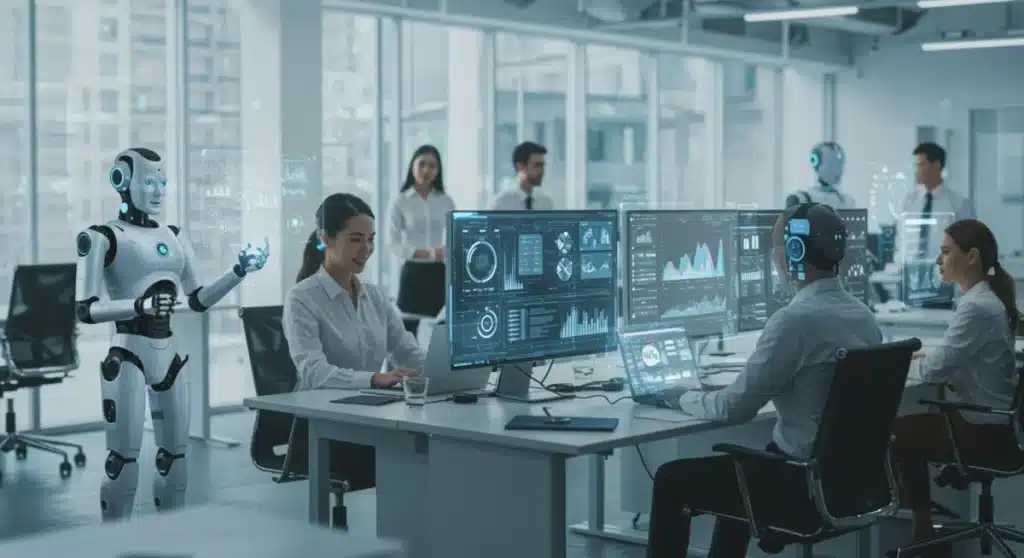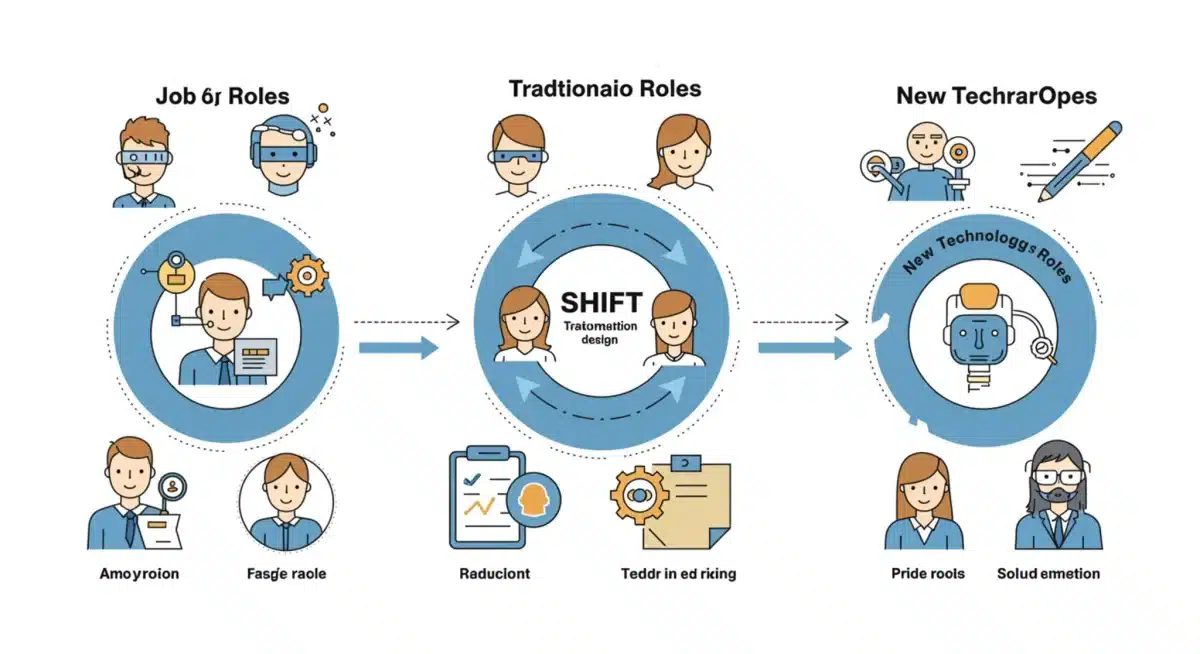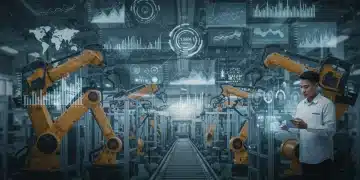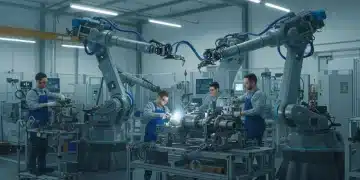The Future of Work: AI Automation and US Job Market Evolution

AI automation is fundamentally transforming the US job market, necessitating a proactive approach to skill development and adaptation to embrace emerging opportunities and navigate evolving employment landscapes.
The landscape of employment in the United States is undergoing a profound metamorphosis, driven significantly by the rapid advancements in artificial intelligence and automation. This isn’t merely a technological shift; it’s a societal one, reshaping industries, redefining job roles, and demanding new skills from the workforce. Understanding AI automation job market impacts is crucial for individuals, businesses, and policymakers alike as we navigate this exciting yet challenging era.
Understanding the AI Revolution in the Workplace
Artificial intelligence and automation are no longer concepts confined to science fiction; they are tangible forces actively integrating into various sectors of the US economy. From manufacturing lines to customer service centers, AI-powered systems are performing tasks with unprecedented efficiency and precision, leading to significant shifts in how work is done.
This revolution is characterized by the increasing capability of machines to learn, adapt, and execute complex tasks that previously required human cognitive abilities. While some view this with apprehension, others see immense potential for innovation, productivity gains, and the creation of entirely new economic opportunities. The key lies in understanding the nuances of this transformation rather than reacting with broad generalizations.
Defining AI and Automation
To fully grasp the implications, it’s essential to differentiate between AI and automation, though they often work hand-in-hand. AI refers to the simulation of human intelligence in machines programmed to think like humans and mimic their actions. Automation, on the other hand, is the use of technology to perform tasks with minimal human intervention. When combined, AI-powered automation brings sophisticated decision-making and pattern recognition to automated processes.
- Artificial Intelligence (AI): Focuses on intelligent behavior, learning, and adaptation.
- Automation: Concentrates on executing repetitive tasks efficiently.
- AI-Powered Automation: Integrates intelligence into automated systems for complex operations.
The convergence of these technologies promises to enhance human capabilities, freeing up workers from mundane tasks and allowing them to focus on more creative, strategic, and interpersonal aspects of their roles. This shift demands a re-evaluation of educational paradigms and workforce development strategies.
Ultimately, the AI revolution in the workplace is about more than just technology; it’s about redefining the human-machine relationship and leveraging the strengths of both to foster a more productive and innovative economy. Embracing this change, rather than resisting it, will be critical for success.
Impact on Traditional Job Roles and Industries
The advent of AI automation has sent ripples across virtually every industry, fundamentally altering traditional job roles and, in some cases, rendering certain tasks obsolete. This transformative period requires a clear-eyed assessment of which sectors and positions are most vulnerable, and which are primed for evolution.
While concerns about job displacement are valid, it’s equally important to recognize the creation of new roles and the augmentation of existing ones. The narrative isn’t solely about replacement but also about reallocation of human effort towards higher-value activities that AI cannot yet replicate.
Industries Undergoing Significant Transformation
Several industries are experiencing profound shifts due to AI and automation. Manufacturing, for instance, has seen an increased reliance on robotics for assembly and quality control, leading to a demand for skilled technicians who can program and maintain these complex systems. Similarly, the financial sector is leveraging AI for fraud detection, algorithmic trading, and personalized financial advice, impacting roles from data entry clerks to financial analysts.
- Manufacturing: Increased automation of assembly lines, robotics for precision tasks.
- Finance: AI for fraud detection, algorithmic trading, predictive analytics.
- Healthcare: AI for diagnostics, drug discovery, personalized treatment plans.
- Transportation: Development of autonomous vehicles, logistics optimization.
These changes aren’t limited to blue-collar jobs; white-collar professions are also being reshaped. Lawyers use AI for document review, and marketing professionals utilize AI for targeted advertising and customer insights. The common thread is the automation of routine, data-intensive tasks, allowing humans to focus on complex problem-solving, creativity, and interpersonal communication.

The impact of AI automation on traditional job roles is a multifaceted phenomenon. While some roles may diminish, the overall trend points towards a restructuring of work, where human skills are complemented and enhanced by AI, leading to more efficient and innovative outcomes across industries.
Emerging Opportunities and New Job Creation
While the discussion around AI automation often focuses on job displacement, a critical and often overlooked aspect is the emergence of entirely new job categories and significant opportunities for those who adapt. The technological revolution is not just about taking away; it’s also about giving rise to novel demands and specialized roles.
This creation of new jobs is a testament to the dynamic nature of innovation. As AI solves old problems, it invariably creates new ones that require human ingenuity and oversight. These emerging roles are often highly skilled, requiring a blend of technical expertise and uniquely human capabilities.
New Roles Driven by AI Adoption
The proliferation of AI systems necessitates a new breed of professionals to design, develop, deploy, and manage them. Data scientists, AI ethicists, machine learning engineers, and robotics technicians are just a few examples of roles that have either emerged or seen a dramatic increase in demand directly attributable to AI. These positions are foundational to building and maintaining the AI infrastructure that underpins modern economies.
- AI Ethicists: Ensuring fair, unbiased, and responsible AI development.
- Prompt Engineers: Optimizing AI model interactions for desired outputs.
- Robotics Technicians: Installing, maintaining, and troubleshooting automated systems.
- Data Scientists: Analyzing vast datasets to train and improve AI algorithms.
Beyond direct AI development, other roles are emerging in areas like human-AI collaboration specialists, who design interfaces and workflows where humans and AI can work together effectively. The creative industries are also seeing new opportunities for content creators who can leverage AI tools to enhance their output, rather than being replaced by them.
The creation of new job opportunities driven by AI automation underscores the importance of foresight and adaptability. Investing in education and training for these emerging fields will be vital for individuals and the US economy to thrive in this evolving landscape.
The Pivotal Role of Upskilling and Reskilling
In a job market increasingly shaped by AI automation, the ability of the workforce to adapt through continuous learning, or upskilling and reskilling, has become paramount. This isn’t merely a recommendation; it’s a necessity for relevance and continued employment in a rapidly evolving economic landscape.
Upskilling involves enhancing existing skills, often with a technological focus, to perform current jobs more effectively in an AI-augmented environment. Reskilling, on the other hand, means acquiring entirely new skills to transition into different roles or industries that are emerging due to technological shifts.
Strategies for Workforce Adaptation
Educational institutions, businesses, and government agencies all have a critical role to play in facilitating this adaptation. Companies are increasingly investing in internal training programs, recognizing that retaining and developing their existing workforce is often more cost-effective than constant external recruitment. Online learning platforms have also democratized access to specialized courses, making skill acquisition more accessible than ever.
- Corporate Training Programs: Companies investing in AI literacy and specific tech skills.
- Online Learning Platforms: Accessible courses in data science, AI, and programming.
- Government Initiatives: Funding for vocational training and apprenticeship programs.
- Micro-credentials: Short, focused certifications for specific skills.
Individuals, too, bear responsibility for their own career trajectory. Proactively seeking out learning opportunities, embracing a growth mindset, and understanding the evolving demands of their industries are crucial. The focus should be on developing skills that are inherently human—creativity, critical thinking, emotional intelligence, and complex problem-solving—as these are the areas where AI currently falls short.

Upskilling and reskilling are not just about learning new tools; they are about fostering a culture of lifelong learning. This continuous evolution of skills will be the cornerstone of a resilient and adaptable workforce capable of thriving alongside AI automation.
Ethical Considerations and Societal Implications
The widespread integration of AI automation into the US job market brings with it a complex web of ethical considerations and profound societal implications. Beyond the immediate economic shifts, we must grapple with questions of fairness, equity, privacy, and the very nature of human work.
Ignoring these ethical dimensions would be short-sighted, potentially leading to unintended consequences that could exacerbate social inequalities and erode public trust. A thoughtful and proactive approach is essential to ensure that AI serves humanity’s best interests.
Addressing Bias and Discrimination in AI
One of the most pressing ethical concerns is the potential for AI algorithms to perpetuate or even amplify existing societal biases. If AI systems are trained on biased data, they will inevitably produce biased outcomes, which can lead to discrimination in hiring, loan applications, criminal justice, and other critical areas. Ensuring AI fairness requires careful data curation, algorithmic transparency, and diverse development teams.
- Algorithmic Bias: AI systems reflecting and amplifying human prejudices.
- Data Privacy: Protecting personal information used by AI for training and operations.
- Job Quality: Ensuring new AI-augmented roles maintain or improve worker well-being.
- Digital Divide: Preventing a widening gap between those with and without AI skills.
Furthermore, the societal implications extend to questions of income inequality. If the benefits of AI automation primarily accrue to a small segment of the population, it could lead to increased wealth concentration and social unrest. Policies such as universal basic income, robust social safety nets, and progressive taxation are often discussed as potential mechanisms to mitigate these risks and ensure a more equitable distribution of AI-driven prosperity.
The ethical and societal dimensions of AI automation demand a multidisciplinary approach, involving technologists, ethicists, policymakers, and the public. Proactive dialogue and inclusive decision-making are vital to steer this powerful technology towards a future that benefits all members of society.
Government and Policy Responses to AI Disruption
As AI automation continues to reshape the US job market, proactive and thoughtful government and policy responses are becoming increasingly critical. These responses aim to mitigate potential negative impacts, foster innovation, and ensure an equitable transition for the workforce and the economy as a whole.
Without clear policy frameworks, the benefits of AI might be unevenly distributed, and the challenges unaddressed. Governments play a crucial role in steering this technological transformation towards a future that is inclusive and prosperous for all citizens.
Key Policy Areas for Consideration
One primary area of focus is education and workforce development. Governments are exploring investments in STEM education, vocational training, and apprenticeship programs designed to equip workers with the skills needed for the AI-driven economy. This includes funding for community colleges and partnerships with private industry to create relevant curricula.
- Education Reform: Investing in STEM and digital literacy from early education.
- Worker Retraining Programs: Funding initiatives for upskilling and reskilling displaced workers.
- Innovation Incentives: Tax breaks and grants for companies developing AI responsibly.
- Ethical AI Regulation: Developing guidelines for AI use, bias, and accountability.
Another crucial aspect is the regulation of AI itself, particularly concerning ethical deployment, data privacy, and algorithmic transparency. Policymakers are grappling with how to balance innovation with safeguards, ensuring that AI systems are fair, accountable, and do not infringe upon individual rights. This includes discussions around data governance and the establishment of regulatory bodies to oversee AI development.
Additionally, governments are examining social safety nets and economic support systems. Proposals such as expanded unemployment benefits, wage insurance, or even universal basic income are being debated as potential ways to support individuals whose livelihoods are significantly impacted by automation. The goal is to create a resilient society that can absorb the shocks of technological change without leaving large segments of the population behind.
Government and policy responses to AI disruption require a delicate balance. They must encourage innovation while simultaneously protecting workers and ensuring that the benefits of AI are shared broadly across society. Collaborative efforts between public and private sectors will be essential for successful implementation.
Preparing for the Future: Strategies for Individuals and Businesses
Navigating the evolving landscape of AI automation job market demands a forward-thinking approach from both individuals and businesses. Proactive strategies, rather than reactive ones, will be key to thriving in an economy increasingly shaped by artificial intelligence and automated processes.
For individuals, this means taking ownership of their career development and embracing lifelong learning. For businesses, it involves strategic investment in technology and human capital, fostering a culture of innovation and adaptability.
Individual Strategies for Career Resilience
Individuals must focus on developing a diverse skill set that complements AI capabilities. This includes technical skills like data literacy and basic coding, but also uniquely human skills such as creativity, critical thinking, emotional intelligence, and complex problem-solving. These are the areas where human workers currently have a distinct advantage over machines.
- Lifelong Learning: Continuously acquiring new knowledge and skills.
- Human-Centric Skills: Developing creativity, critical thinking, and empathy.
- Adaptability: Embracing change and being open to new roles and industries.
- Networking: Building connections to stay informed about industry trends.
Embracing a growth mindset, being open to reskilling for entirely new professions, and actively seeking out opportunities for continuous professional development will be crucial. The traditional linear career path is giving way to a more fluid and dynamic journey, requiring individuals to be agile and self-directed in their learning.
Business Strategies for Sustainable Growth
Businesses must recognize that AI adoption is not just about cost reduction but about strategic enhancement. This involves investing in AI technologies that augment human capabilities, rather than solely replacing them. Cultivating a workforce that is comfortable collaborating with AI, and providing the necessary training, will be paramount.
Furthermore, businesses should focus on creating roles that leverage human strengths in areas like strategic planning, innovation, customer relationship management, and ethical oversight of AI systems. Fostering an organizational culture that promotes experimentation, learning from failure, and continuous improvement will be vital for long-term success in the AI era.
Preparing for the future of work requires a concerted effort from all stakeholders. By adopting proactive strategies, individuals can build resilient careers, and businesses can achieve sustainable growth, ensuring a prosperous and adaptable future alongside AI automation.
| Key Aspect | Brief Description |
|---|---|
| Job Transformation | AI automates routine tasks, leading to the evolution and creation of new roles across sectors. |
| Skills Evolution | Demand for digital literacy, critical thinking, creativity, and emotional intelligence increases. |
| Upskilling/Reskilling | Essential for workforce adaptation through continuous learning and new skill acquisition. |
| Ethical Considerations | Addressing AI bias, data privacy, and ensuring equitable societal impacts are crucial. |
Frequently Asked Questions About AI and the Job Market
While AI automation will displace some jobs, history suggests it’s more likely to transform roles and create new ones rather than cause widespread unemployment. The focus shifts to humans working alongside AI, requiring adaptation and new skill sets.
Critical skills include digital literacy, data analysis, problem-solving, creativity, emotional intelligence, and adaptability. These human-centric abilities complement AI’s strengths in routine and data-intensive tasks.
Individuals should embrace lifelong learning through upskilling and reskilling, pursuing online courses, certifications, and vocational training. Developing soft skills and networking are also crucial for career resilience.
Businesses must invest in employee training, foster human-AI collaboration, and create roles that leverage human strengths. Prioritizing a culture of continuous learning and strategic AI adoption is vital for sustainable growth.
Yes, key ethical concerns include algorithmic bias, data privacy, and the potential for increased income inequality. Responsible AI development and robust policy frameworks are essential to address these challenges effectively.
Conclusion
The inexorable march of AI automation is not just redefining the US job market; it is fundamentally reshaping the very fabric of work and economic participation. While the prospect of such profound change can evoke both excitement and apprehension, it is clear that adaptability, continuous learning, and strategic foresight will be the cornerstones of success. Both individuals and institutions must embrace this transformation, focusing on skill development that complements AI, addressing ethical considerations head-on, and fostering inclusive growth. By doing so, we can harness the immense potential of AI to create a more productive, innovative, and equitable future of work for all.





